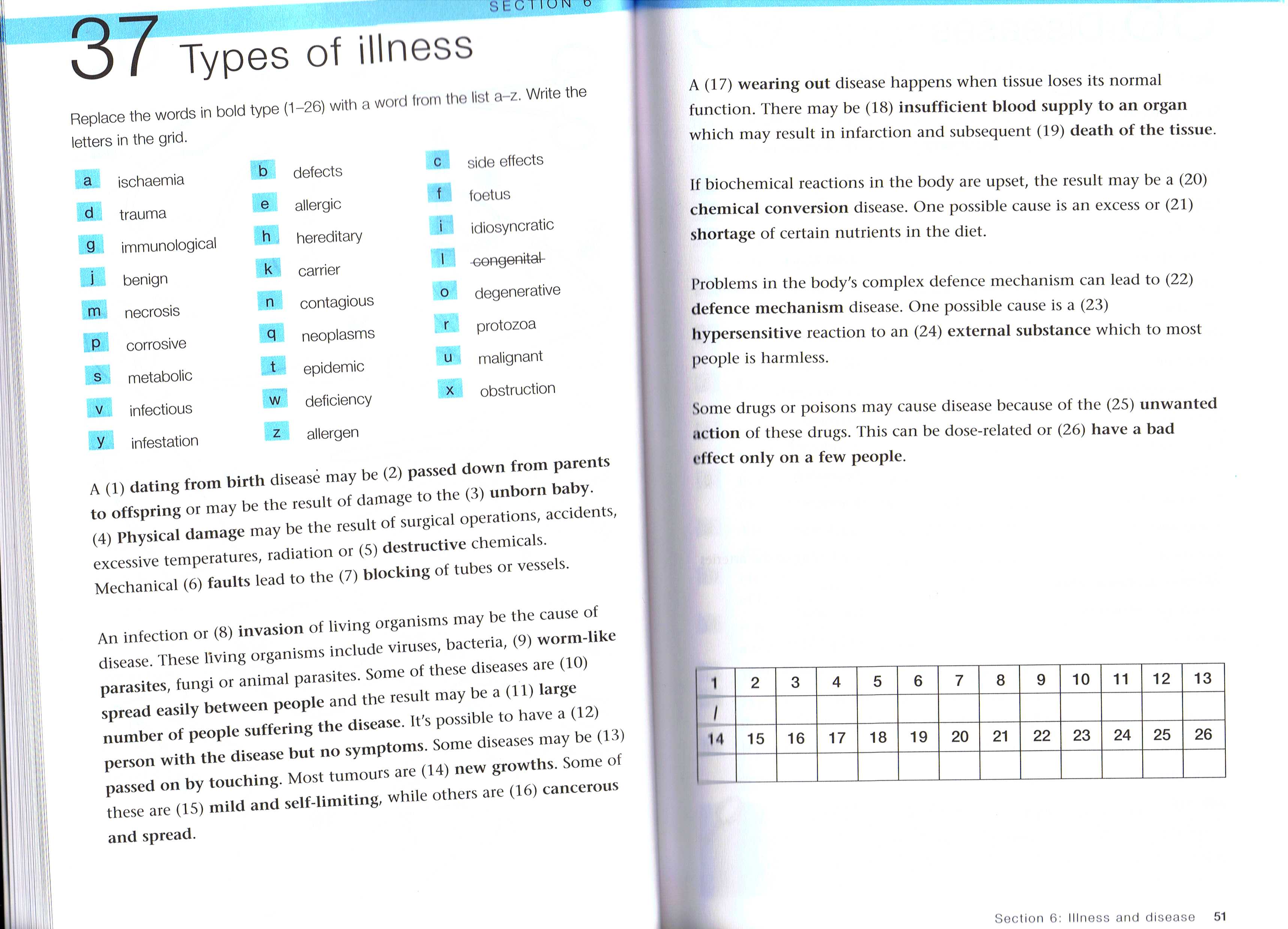50,51


S E C T I u IN D
Replace the words in bold type (1-26) with a word frorn the list a-z. Write the letters in the grid.
|
a |
ischaemia |
b |
defects |
c |
side effects |
|
d |
trauma |
e |
allergic |
f |
foetus |
|
9 |
immunological |
h |
hereditary |
i |
idiosyneratie |
|
j |
benign |
k |
carrier |
1 |
-eengenital |
|
m |
necrosis |
n |
contagious |
0 |
degenerative |
|
P |
corrosive |
q |
neoplasms |
r |
protozoa |
|
s |
metabolic |
t |
epidemie |
u |
malignant |
|
V |
infectious |
w |
deficieney |
X |
obstruction |
|
y |
infestation |
z |
allergen |
A (1) dating from birth disease may be (2) passed down from parents to offspring or may be the result of damage to the (3) unborn baby.
(4) Physical damage may be the result of surgical operations, accidents, excessive temperatures, radiation or (5) destructive Chemicals. Mechanical (6) faults lead to the (7) blocking of tubes or vessels.
An Infection or (8) invasion of living organisms may be the cause of disease. These living organisms include viruses, bacteria, (9) worm-like parasites, fungi or animal parasites. Some of these diseases are (10) spread easily between people and the result may be a (11) large nuinber of people suffering the disease. It's possible to have a (12) person with the disease but no symptoms. Some diseases may be (13) passed on by touching. Most tumours are (14) new growths. Some of these are (15) mild and self-limiting, while others are (16) cancerous and spread.
A (17) wearing out disease happens when tissue loses its normal function. There may be (18) insufficient blood supply to an organ which may result in infarction and subsequent (19) death of the tissue.
If biochemical reactions in the body are upset, the result may be a (20) Chemical conversion disease. One possible cause is an excess or (21) shortage of certain nutrients in the diet.
Problems in the body's complex defence mechanism can lead to (22) defence mechanism disease. One possible cause is a (23) hypersensitive reaction to an (24) external substance which to most people is harmless.
Some drugs or poisons may cause disease because of the (25) unwanted action of these drugs. This can be dose-related or (26) have a bad effect only on a few people.
|
1 |
2 |
3 |
4 |
5 |
6 |
7 |
8 |
9 |
10 |
11 |
12 |
13 |
|
/ | ||||||||||||
|
14 |
15 |
16 |
17 |
18 |
19 |
20 |
21 |
22 |
23 |
24 |
25 |
26 |
Section 6: lllness and disease 51
Wyszukiwarka
Podobne podstrony:
88970 img022 (20) GrammarEntertaining clients Read the following article and divide the words in bol
Amplituner Pionier Re 105 2 t 16 33 47 35 50 51 49 19 37 43 38 46 39 48 29 24 26
THE CPTWD METHOD Besides this, the rangę of U has also been increased to 50 Bar in order to achieve
cp 51 Excellent Good Poor Bad Class C. The aterage type (American) Which of the four in Class C do y
50 (241) 94 The Viking Age in Denmark Figurę 26 Part of thc city of Lund (Skinę) at the beginning of
If in the expression (2) in order to replace the shifted copy of voltage U(t + x) with the shifted c
00268 ?a148167663d78e6679e602ee961c3b 270 Montgomery experiments are often used in the design and/o
IMG 51 Structure offlagella and attachment to the celi wali and membranę In gram negative
więcej podobnych podstron